Does meeting with your manager feel nerve wracking to you? Or do you feel like the discussions never lead anywhere productive?
Don't worry, we're here to help you turn these meetings into pivotal moments to serve your long term goals.
In this blog, we'll delve into the secrets of effective one-on-ones. We'll explore:
- What Happens in a One-on-One?
- How to Prepare for a 1:1
- Questions to Ask Your Manager
- Bonus Tips for Choosing and Asking Questions
What Happens in a One-on-One?
1:1 meetings are where hopefully goals are aligned, feedback is exchanged, and mutual understanding is deepened.
Who's in the Room? The key participants in these meetings are:
- The Employee: Bringing forward their work, seeking guidance, and expressing career aspirations.
- The Manager: Offering feedback, setting expectations, and supporting the employee's growth within the company.
Occasionally, one-on-ones can extend to include the manager's manager, especially when conversations need to dive into broader career strategies or when gaining additional perspective is beneficial.
Duration and Frequency: Typically, a one-on-one meeting lasts between 30 to 60 minutes, offering a regular touchpoint with your manager about the past week or couple of weeks.
The Agenda: Expect to spend:
- The first 10–15 minutes discussing recent achievements or updates.
- Another 10–15 minutes delving into current projects or roadblocks.
- The remainder of the time is often reserved for long-term discussions about professional development and future goals.
Flexibility Is Key: While structure is good, the best one-on-one meetings can sometimes go off-script. They adapt to what's most pressing, whether that's tackling a new challenge head-on or celebrating a win that was a long time in the making.
Two-Way Conversation: It's not a monologue but a dialogue. Expect to exchange ideas, offer support, and sometimes agree to disagree – all in the spirit of moving forward.
Action Items and Follow-Ups: A critical part of these recurring meetings is wrapping up with clear action items. What's agreed upon here will likely shape your work until the next one-on-one.
How to Prepare for a 1:1
Preparation is the bedrock of a productive one-on-one meeting. Here's how to do it well:
Review Past Performance
Begin by assessing your recent work against the goals and action items set in previous meetings. Reflect on your achievements and consider any areas where you faced challenges. This will help you identify patterns in your performance and set the stage for a productive discussion.
Prepare a Simple Agenda with Questions
While you should have an idea of the questions and topics you want to discuss, avoid crowding the agenda so you don't become confused during the meeting.
Focus on key talking points that are relevant to your current work and future goals. A well-thought-out meeting agenda is a tool that will guide the conversation to cover both your day-to-day responsibilities and your career path.
Let AI take care of notetaking
With the dynamic and challenging nature of one-on-ones, it's crucial to stay present during the conversation.
By recording the meeting and summarizing the discussions, Wudpecker's AI notetaker allows you to engage fully without having to worry about missing any details or not listening well enough.
But how does it work?
1. Sign in to Wudpecker by clicking "Get started"
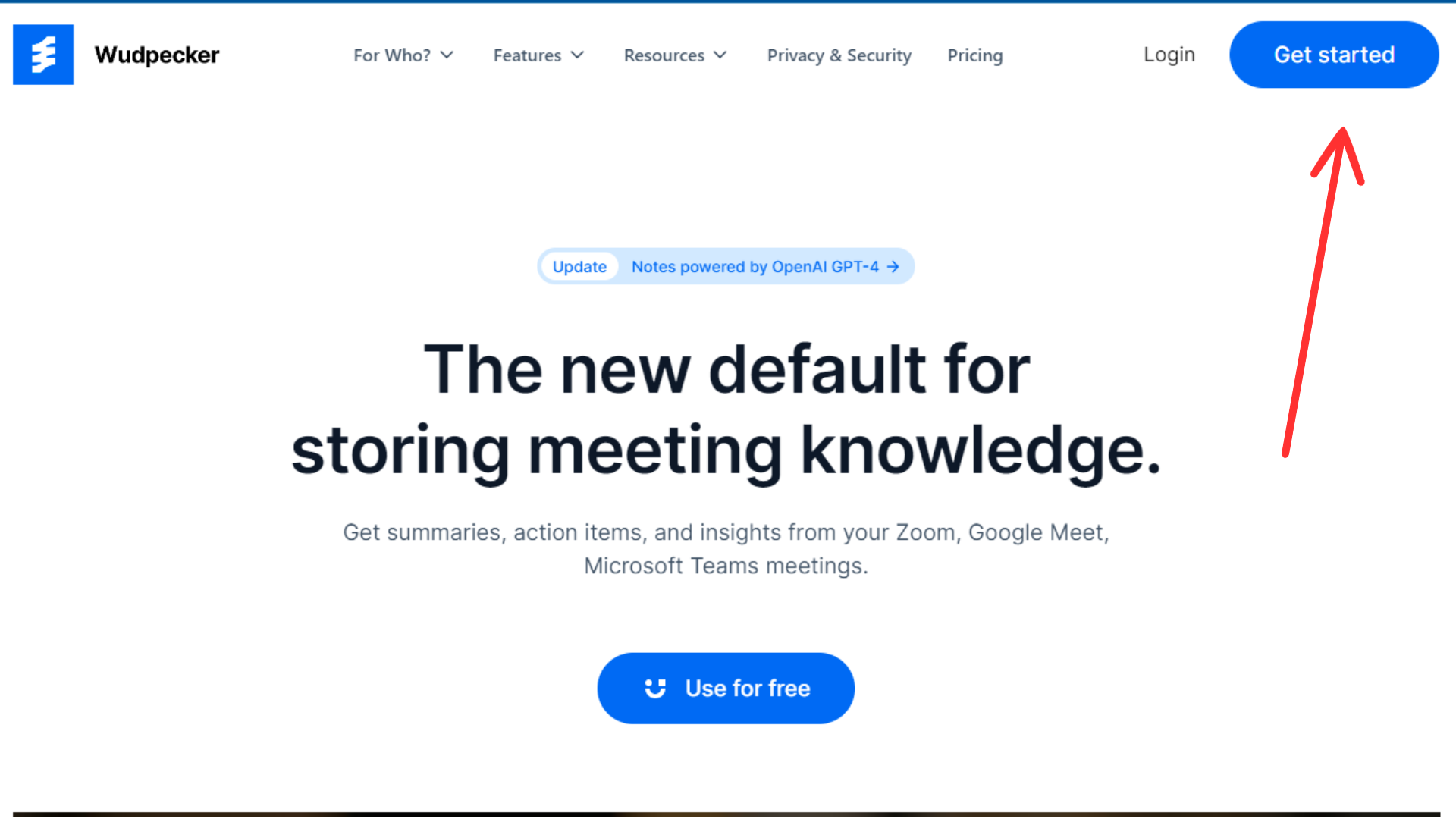
2. Continue either by connecting a Google or Microsoft account to Wudpecker.
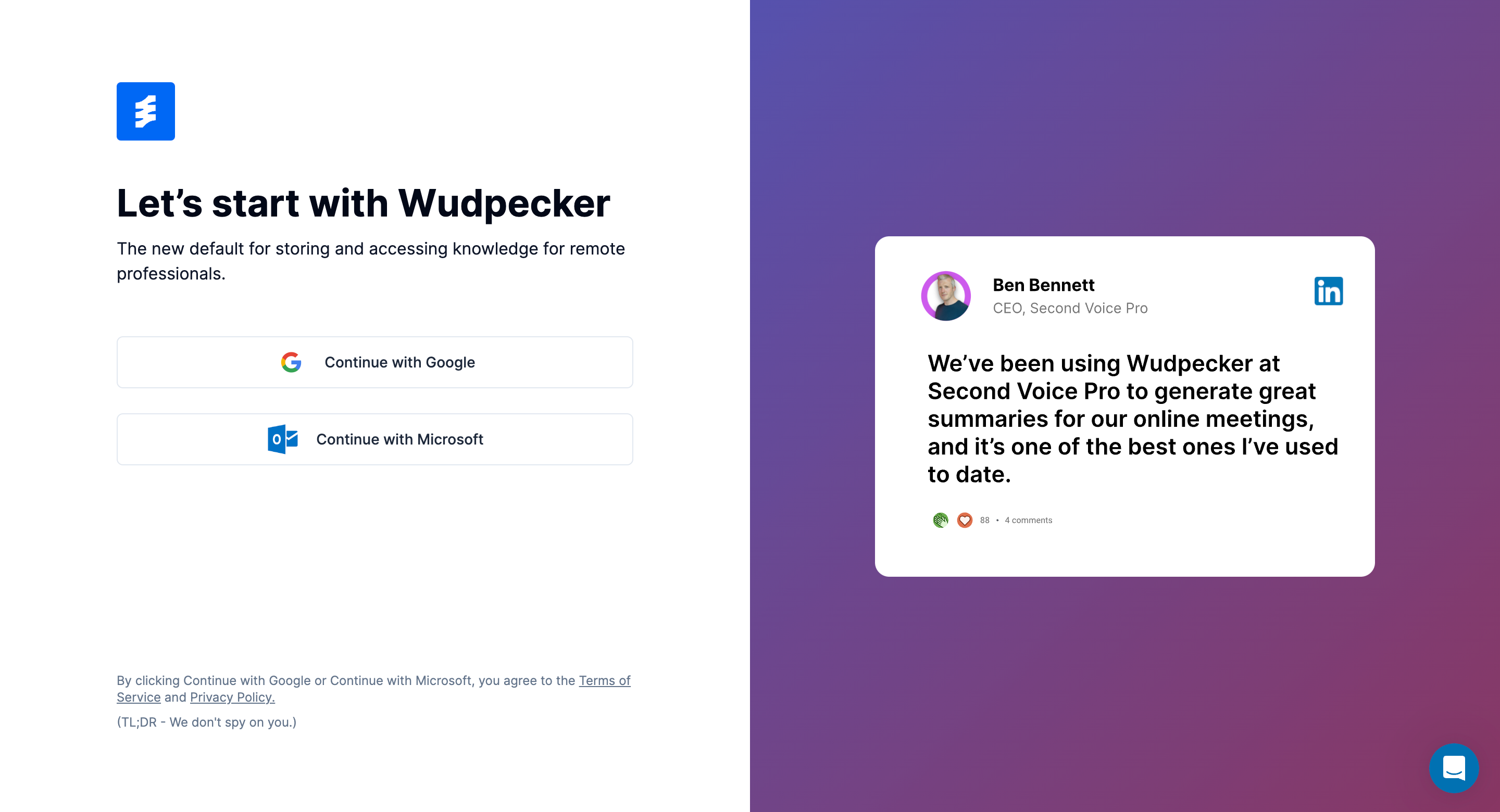
After this, accept the permission for Wudpecker to access your calendar (this is for the purpose of automatically joining calls for a more seamless experience).
3. Make sure the meeting you want notes for shows up in "Upcoming calls" and that there's an activated toggle button next to it.
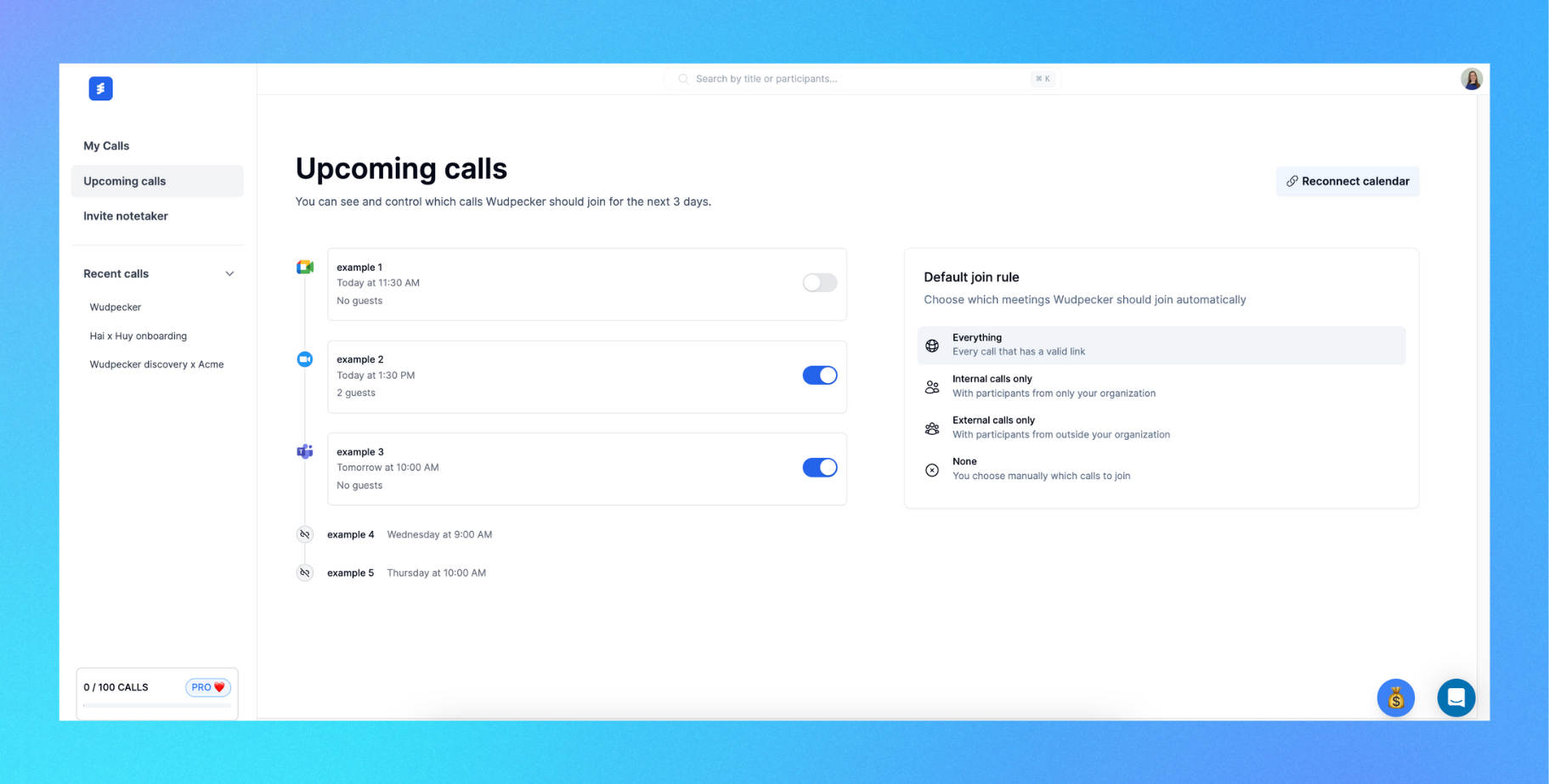
If this is not the case...
- Make sure you signed up with the correct account. The items on the menu are all the events in your calendar connected to the account you signed up with.
- Check that the meeting event you have in your calendar has a meeting link. (Psst: The meeting link needs to be in the "location" of the event)
- Try clicking on the toggle button to activate it (it should be activated/colored automatically).
- If none of this helps, you can always contact us by pressing the chat button on the right bottom corner.
Easy peasy! For any future meetings, just admit the notetaker in each time, and you'll be all set!
4. Once you're in the meeting, allow Wudpecker's Notetaker to join by clicking "Admit".
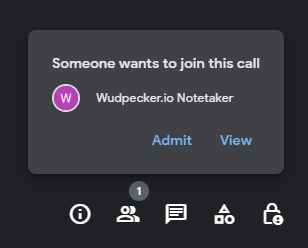

5. Soon after the meeting has ended, you'll see notes and a transcript for your meeting in "My Calls".
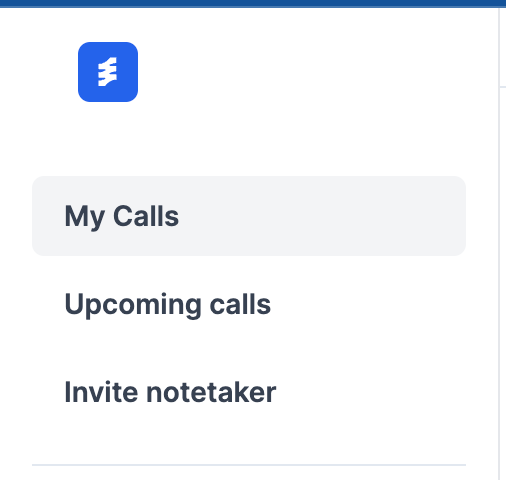
Articulate Your Career Goals
Articulate your career aspirations clearly. Understanding and being able to explain the skills you want to develop or how you envision your role evolving signals to your manager that you are proactive about your professional growth.
Questions to Ask Your Manager
Professional Growth & Career Pathway
- What key achievements would you like to see from me before our next meeting?
- Could you share your thoughts on how my role might evolve in the next year?
- Are there any particular skills that you believe would make me more effective in my current role?
- What expectations do you have for me in this position over the next few months?
- Can you suggest any professional development opportunities, resources, or training for me?
- What advice would you offer to someone in my role aiming for the next level in their career?
- Is there a specific area within my role where you see a potential for significant impact?
- How can I align my career growth goals with the company's current priorities?
- What are the most critical skills or competencies I should develop for future opportunities within the team?
- Are there opportunities in the near future for me to take on more leadership or project management responsibilities?
Prioritizing Tasks & Aligning With Company's Strategy
- What should be my highest priority in the coming weeks, and how does that align with our team’s strategy?
- How would you like to be updated on my work progress, and what details are most important to you?
- Which aspect of my current projects would you like me to focus on for the greatest impact?
- If I have resources to spare, which areas of the company could benefit most from my involvement?
- How can I better support our team's objectives and deliverables from my position?
- In your view, what would success look like for me in this role over the next quarter?
- Are there any immediate tasks or projects where you'd like me to take the lead?
- How can I contribute to the team's success beyond my regular duties?
- What are the team's critical goals right now, and how can I contribute to achieving them?
- Can you help me understand how my work fits into the overall company strategy?
Cultural Integration & Team Dynamics
- How can I more effectively embody and promote our company values in my day-to-day work?
- In what ways can I help enhance team dynamics and contribute to a healthy work environment?
- Are there any actions I can take to support and strengthen our team culture?
- What can I do to foster better collaboration within the team and with other departments?
- How does our team's culture impact our collective productivity, and what can I do to contribute positively?
- Is there a skill that could benefit both me and the team?
- How can I help new team members understand and integrate into our team culture?
- Is there a team dynamic or cultural aspect you think we could improve, and if so, how?
- Can you provide examples of when our team culture positively influenced the outcome of a project?
- How can I support initiatives that are aimed at improving employee engagement and satisfaction?
Feedback Loop & Relationship Building
- How would you prefer to receive updates on my work, and what's the best way for me to share those updates?
- What would you like me to keep you updated on and how often?
- How can I better support you and the management team in your goals and responsibilities?
- What type of feedback is most helpful for you from me regarding our team's challenges and successes?
- How can we ensure that our communication is efficient and effective, keeping us both informed and on the same page?
- Is there a particular way you would like to see me respond to the feedback you give?
- What can I do to ensure that the feedback I provide to you is constructive and actionable?
- In terms of our working relationship, what's one thing you'd like to see us improve?
- How can I assist in addressing any challenges you're facing with our team or projects?
- Are there any concerns or areas where you feel I could offer more support or insight?
Bonus Tips for Choosing and Asking Questions
Maximizing the value of your one-on-one meetings boils down to the quality of your questions. Here are four key tips to ensure you're asking the right ones:
- Prioritize for Impact: Begin with the end in mind. Prioritize your questions based on their potential impact on your professional development and your team's success. This helps you focus on what's most important and make the best use of your limited time together.
- Craft for Clarity: Aim for questions that encourage clear, actionable answers. For instance, instead of asking if you're meeting expectations, inquire about specific actions you can take to exceed them. It's not just about receiving feedback, but about understanding the steps you can take to grow.
- Encourage Collaboration: Choose questions that invite your manager to work with you in solving problems or brainstorming opportunities. This not only leads to deeper insights but also strengthens your working relationship.
+ Reflect and Act Post-Meeting: After the meeting, reflect on the insights gained and put together an action plan. This shows your manager that you value their input and are committed to continuous improvement.
Conclusion
One-on-one meetings are more than mere touchpoints; they're opportunities to forge a stronger alliance between managers and their direct reports. They're also great for catalyzing the employee's career growth.
The key to unlocking their potential lies in the quality of your preparation and the questions you pose.
Embrace these meetings as a platform for alignment, clarity, and action. With the right approach, each one-on-one can become a milestone on your professional path.
You can do this!
FAQs
What are the best questions to ask manager in one-on-one meetings?
In your one-on-ones, ask about how to align your work with team goals, ways to improve your performance based on feedback, and opportunities for professional growth.
Discuss your immediate priorities, longer-term expectations, and explore how you can further contribute to the team's success.
What are good questions to ask your manager's manager?
When speaking with your manager's manager, focus on the larger vision and strategy for your team or department. Seek their perspective on the company's future and ask for guidance on aligning your career development with the company's objectives and management style.
What do you talk about in a one-on-one meeting with a manager?
A one-on-one meeting is an opportunity to review your progress on projects, identify and address obstacles, receive and act upon feedback, discuss your career ambitions, and strategize on personal development.
It's also an appropriate setting to consider team dynamics, process improvements, and to ensure you're in sync with your manager's expectations.
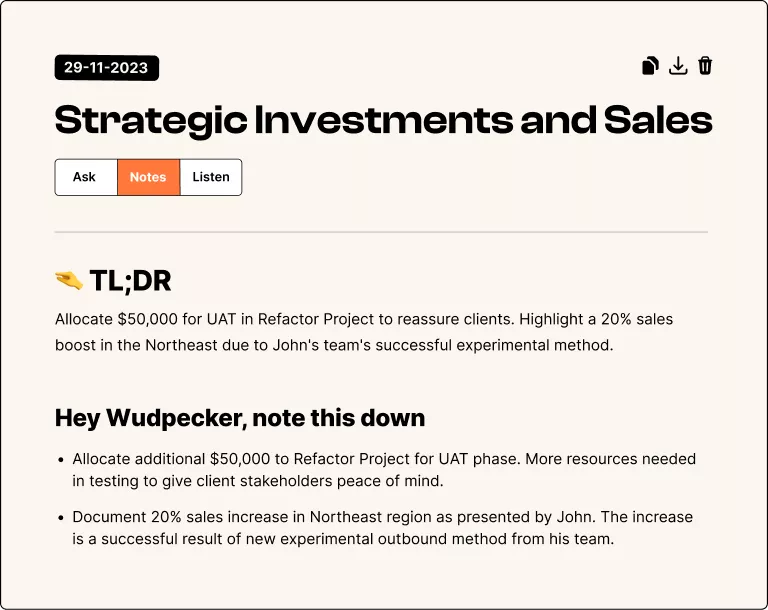

![Ask This from Your Manager in a One-on-One [40 Example Questions]](https://cdn.prod.website-files.com/655f1f2503834616189aa39a/6560b19f098a908a0af19185_654571126fa16d7313492680_ask-this-from-your-manager-in-a-one-on-one-40-example-questions.jpeg)
.svg)




_.png)








.png)
.png)


.png)


.svg)
